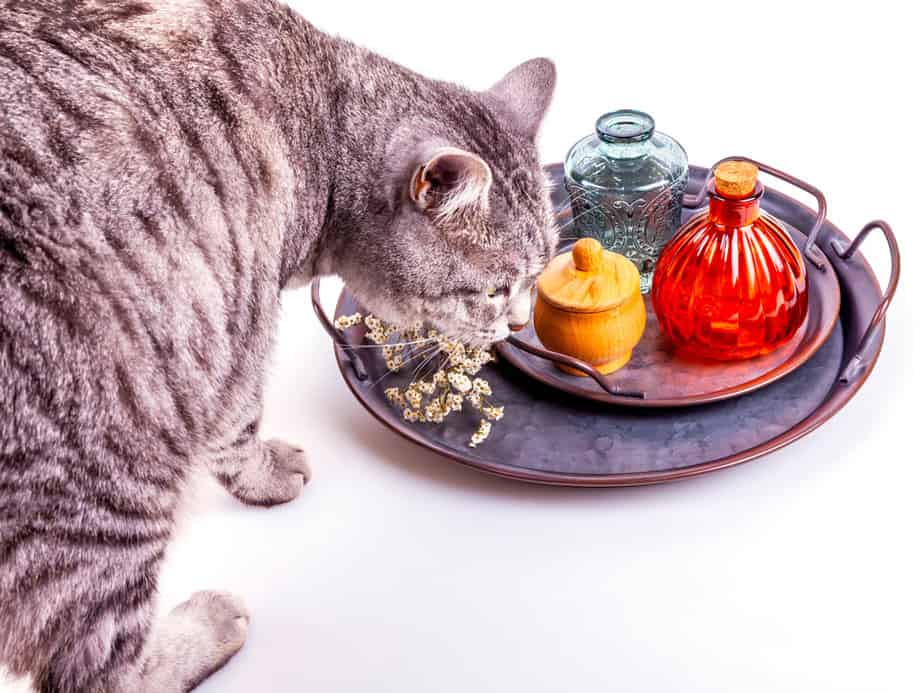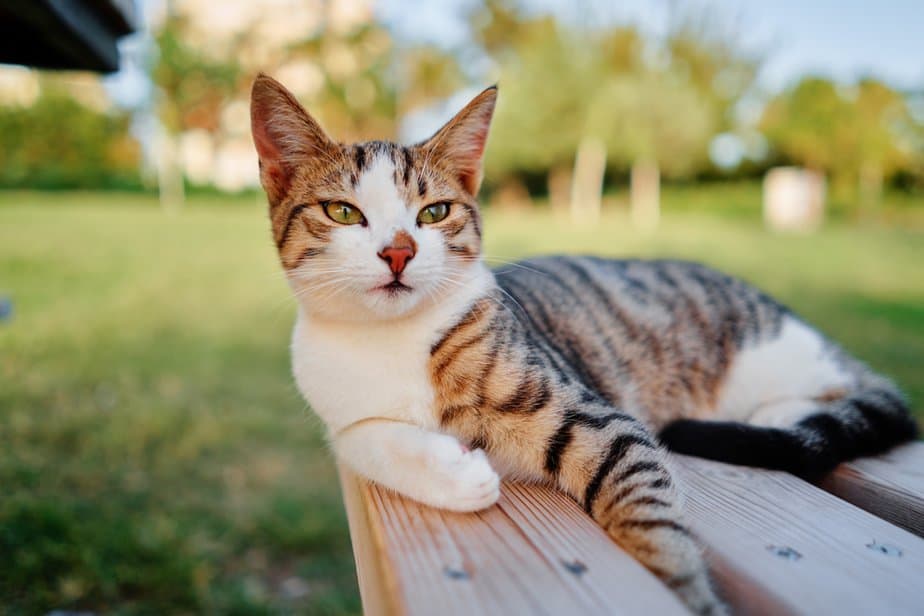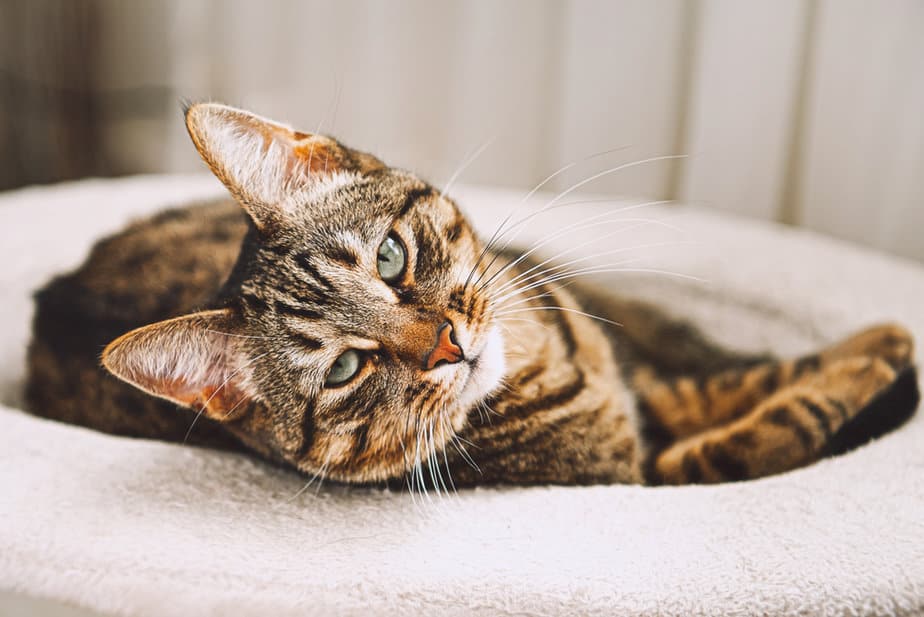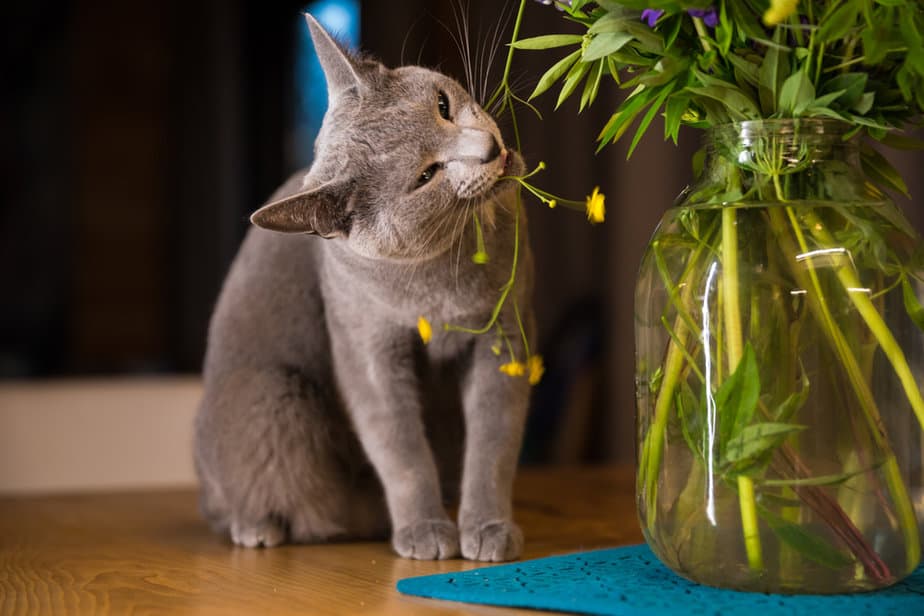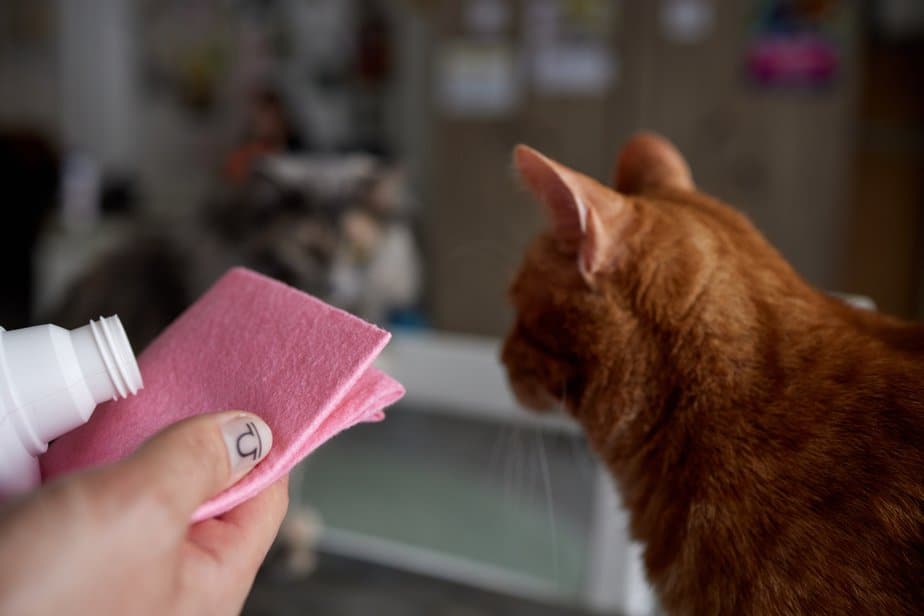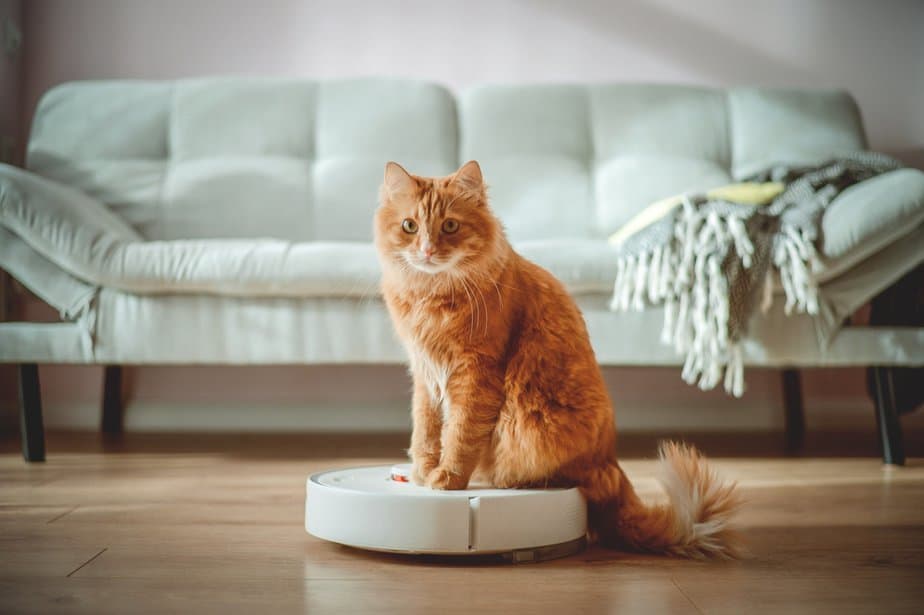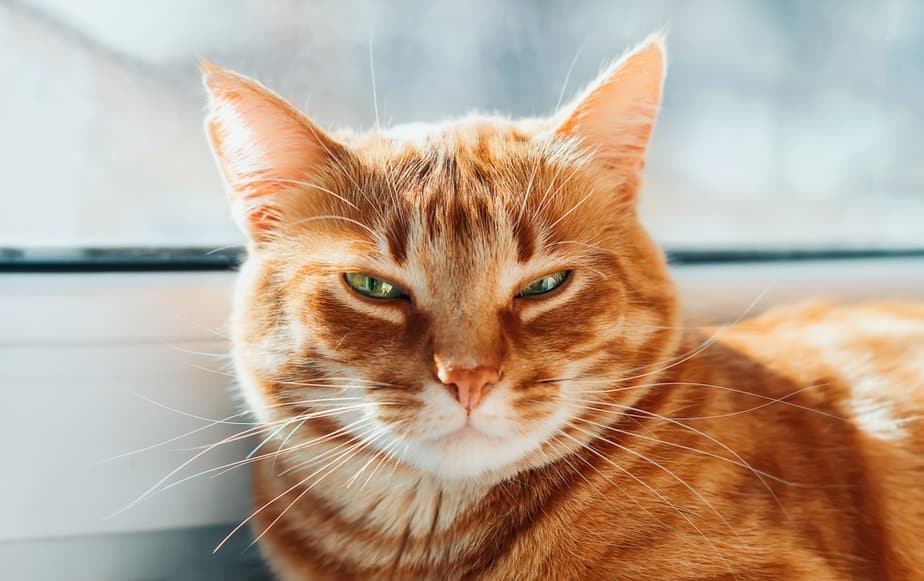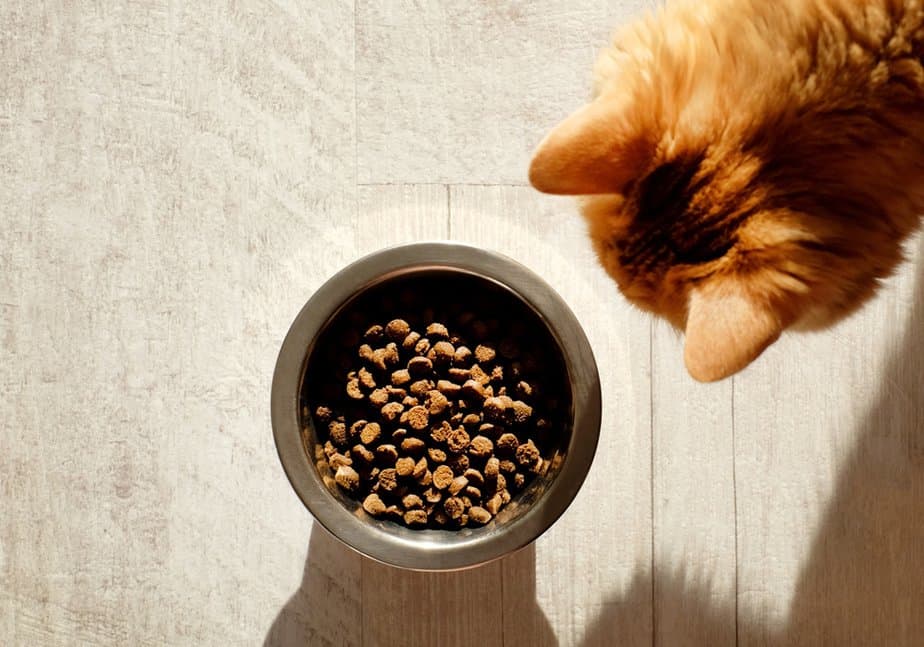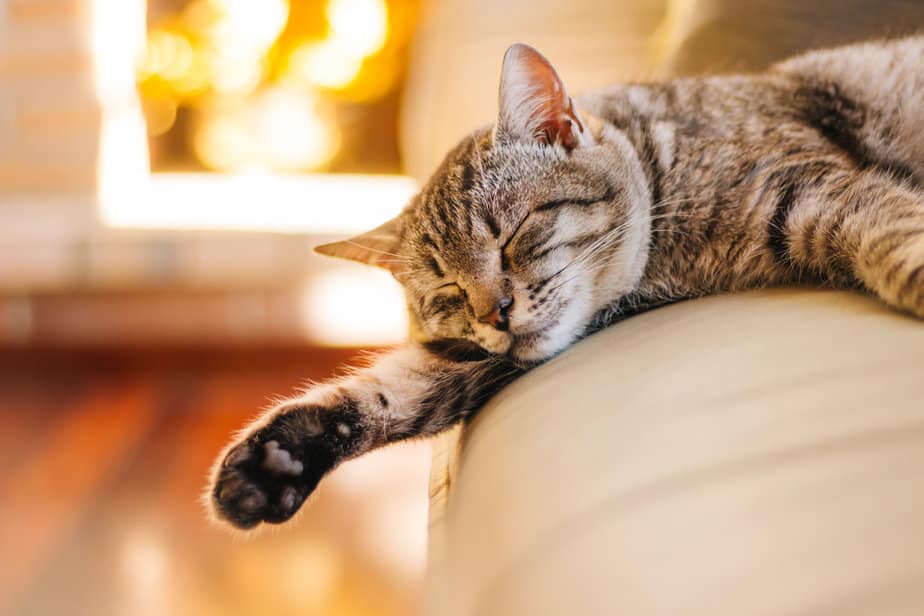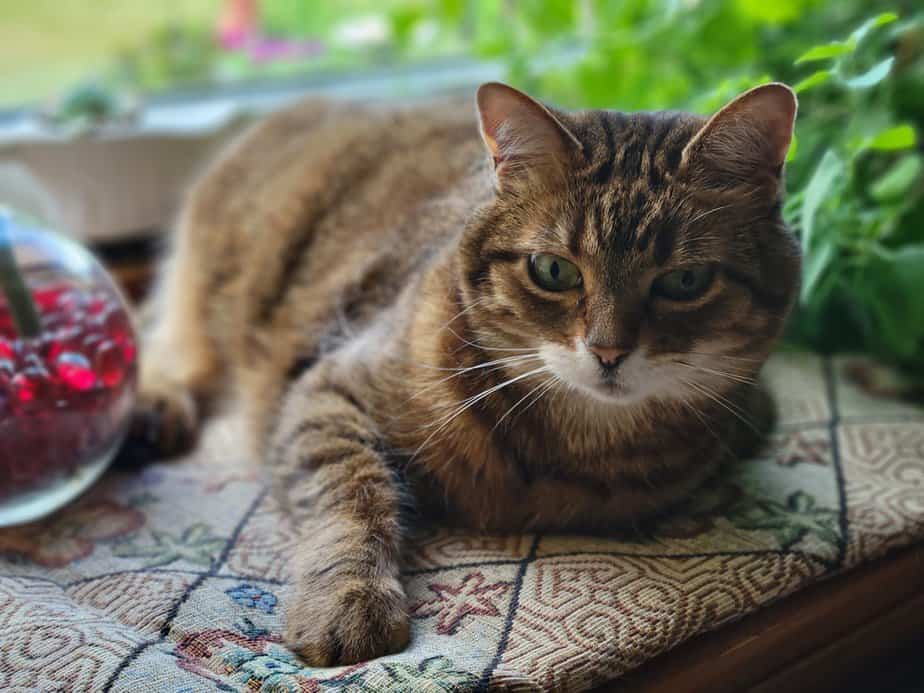📖 Table of Content:
As a pet parent, you’re all too familiar with the struggle of walking around the apartment looking for Mrs. McFluffer and finding her in the kitchen licking who-knows-what off the counter. Argh, can cats eat vinegar?!
When has your life turned into a series of “what’s in your mouth” and “what did you just do”? Or even into sighs of relief when you google whatever your mischievous monster munched on this time and find out she’ll live to see another day?
When has regular cat food become a thing of the past for your four-legged friend? And when has she decided it was acceptable for her to roam around the apartment, sniff and lick everything she can get her paws on, and get herself in all sorts of easily avoidable trouble?
While we can’t help you answer any of these questions, we can certainly help you answer the one from the beginning of this article. So, with this “why are cats so weird” rant out of the way, we can start unraveling the odd relationship your cat has with this sour solution.
According to our friends over at the ASPCA (American Society for the Prevention of Cruelty to Animals), vinegar isn’t that big of a deal for your feline friend. She isn’t likely to experience adverse reactions from a lick or two, but…
That doesn’t mean you should go ahead and pour a cup of apple cider vinegar for your furry friend as a way to celebrate this monumental moment. Contrary to the popular belief, just because something isn’t labeled as toxic doesn’t mean you should add it to your cat’s diet. What?!
Can cats eat vinegar? Can you clean your apartment safely with the particular type of vinegar you have? Keep reading to find out!
So, can cats eat vinegar?
Let’s start from the beginning. What even is vinegar?
What’s the reason most pet owners think it’s harmful to their feline friends? What’s the reason most pet owners think they have to hide it from their kitchen countertops and away from their feline friend’s paws?
Well, vinegar is a sour solution that’s typically made through the process of fermentation. It’s made from different ingredients depending on the type of vinegar we’re talking about. White vinegar, apple cider vinegar, and balsamic vinegar have different bases, flavors, and consistencies.
However, what makes this sour solution so popular among humans isn’t the fragrant odor or the tingling taste. These two components make for a mouth-watering explosion of flavors. But, most humans love vinegar because of its numerous health benefits and surprising chemical properties.
Did we just say chemical?! Yes, we did. These chemical properties might be the main reason why most cat owners panic and call their vet when they realize their curious creature decided there was something delicious about the freshly mopped kitchen floors. Can cats eat vinegar?
Yes, they absolutely can! There’s nothing black and white about different things your feline friend might put into her mouth. But, you can certainly scratch vinegar off the list of things you need to worry about. A couple of licks here and there won’t send your cat into the vet’s office, but…
That still doesn’t mean that you should add vinegar to your cat’s drinking water. Or pour a bunch of vinegar into a spray bottle and spray down the entire apartment. Like with anything else, there’s a right and a wrong way to use vinegar in a household that’s ruled by your four-legged friend.
What makes vinegar good for your cat?
This sour solution is pretty much a holy grail in every household. It’s no wonder you’re looking up “can cats eat vinegar?” You’re completely aware of the incredible health, nutritional, and chemical benefits your cat might be missing out on.
You’ve been feeling a bit bloated and heavy for a couple of weeks? Throw some of your favorite vinegar into your salad and observe how much it helps with your digestive issues. Go for the balsamic one because the trick is in the acetic acid!
You’ve noticed your oven has been in desperate need of a thorough scrub? Make an extraordinary cleaning product with vinegar and baking soda that’s going to leave your oven and your entire kitchen looking and smelling like a pharmacy. Who wouldn’t want that?
So, what makes vinegar good for your cat? This fragrant fluid might not be your cat’s favorite afternoon snack. But, it might be able to help with an array of health issues such as urinary tract infections, mites and fleas, different skin rashes and so much more. Let’s dive in!
1. Vinegar can help with UTIs
There’s a good chance this hasn’t even crossed your mind! But, vinegar is a great home remedy for all sorts of ailments your feline friend might be struggling with. Urinary tract infections, bladder infections, ear infections… You can treat pretty much anything with just a teaspoon of apple cider vinegar.
Well, it might not be as simple as that. But, it’s certainly as simple as it can be when we’re talking about home remedies you can literally find in your own kitchen in a matter of seconds. Make sure you consult with your vet beforehand and you’re good to go.
So, what makes vinegar such a powerful tool in fighting infections? Vinegar has the ability to stop bacteria from growing and spreading around your feline friend’s body. Apple cider vinegar is the best choice because it’s the one your cat is most likely to ingest. But, you can use pretty much any other type.
For instance, if your feline friend has a urinary tract infection you can add a couple of teaspoons of apple cider vinegar or white vinegar into her bowl of food. You can use it as an additional tool in fighting against bacteria. But, don’t use it on its own (that’s what antibiotics are for).
On the other hand, if your furry friend has an ear infection you can add some diluted vinegar to a cotton ball (dip, don’t soak) and use it to wipe away any dirt, mites, and goop. Your cat’s ears are incredibly sensitive, so make sure you don’t go overboard with the wiping.
2. Vinegar can help with mites, fleas, and fungus
This sour solution can also be a great way to get rid of those pesky mites, fleas, and fungus that might be hiding in your four-legged friend’s fur. There’s hardly anything more heart-breaking than seeing your furbaby unsuccessfully scratching and itching every inch of her body! But, there’s hope.
You can use diluted apple cider vinegar or white vinegar in a spray bottle to spray your cat’s fur throughout the day. It’s important that you dilute the vinegar, but… Make sure you don’t add too much water as you need those flea-repelling powers.
What makes vinegar so efficient? Well, the smell of vinegar doesn’t seem to offer the most pleasant housing experience for most parasites. It doesn’t kill any of them, but… It does make them run away and it does stop them from hopping back onto your four-legged friend!
Before you go bonkers on parasites, there are a couple of things you need to take into consideration. Firstly, make sure your feline friend doesn’t have any cuts or sores underneath the fur. You don’t want to accidentally make the entire experience uncomfortable.
Secondly, make sure none of the diluted vinegar ends up anywhere near your feline friend’s eyes. Vinegar can cause a burning sensation, irritate the entire area around the eyes, as well as impair her vision for the rest of the day (or until you manage to wash it out). It’s better to be safe than sorry, don’t you think?
3. Vinegar can help with the health of skin and coat
Your furry friend doesn’t have fleas? Good for you (and good for her), but that doesn’t mean you don’t have any use for vinegar in your household. While it’s true that this sour solution helps with so many flea-related issues, it’s also a great preventative measure.
Vinegar has a strong smell (you don’t say?!). It acts as a repellent for so many different bugs and insects, and pretty much anything else that wants to find a forever home in your cat’s fur. And trust me, that sounds a lot less adorable when it actually happens to your cat.
So, when you’re freaking out and typing “can cats eat vinegar” and “is vinegar safe for cats” you should know that this fragrant fluid can help your cat’s skin and coat in so many different ways.
As mentioned before, you can spray some diluted, organic apple cider vinegar onto your cat’s fur as a preventative measure against different insects, bugs, and fleas. Most parasites hate the smell of vinegar. They won’t come anywhere near your cat as long as you keep doing this.
On the other hand, vinegar is also anti-bacterial and anti-inflammatory which makes it a great tool to clean your cat’s skin and fur. Make sure she doesn’t have any cuts, scratches, and open wounds that might get irritated in the process.
And, you can always add a couple of drops of vinegar into your cat’s water bowl. This will help her with any digestive issues she might have. But, it will also keep her hydrated and ensure the health of her skin and coat from the inside. You’re starting to think vinegar is a magical potion, aren’t you?
4. Vinegar can remove the smell of urine
Your cat does what your cat wants, isn’t that the truth? You have to admit that there are times when your cat doesn’t want to do her business in the litter box. She wants to do it somewhere else in the apartment… Somewhere where everyone who visits you can smell it!
Luckily for you, there’s a great way you can remove the stain and the smell of urine from your favorite furniture… And, it’s hiding in your kitchen! So, next time your four-legged friend decides to have a tinkle in the living room, you don’t have to yell at her. It’s a win-win situation!
So, let’s start from the beginning. Get rid of the mess she made by blotting the area with an old, rugged towel. Make sure you remove every drop of moisture before moving on to the next step. Quick warning – your towel will retain the smell of urine so it’s best you throw it away.
After you’ve done that, you can dilute some organic apple cider vinegar with water. Pour it into a spray bottle and apply it to the area your four-legged friend ruined. Add some baking soda to get rid of the stain, and the diluted ACV should be enough to mask and draw out the smell.
And you’re pretty much done! As for the smell of urine coming from the litterbox… It might be your cue to clean it out more often than you’re doing right now. You can use the vinegar in the spray bottle technique for a quick fix, but your cat might not enjoy the smell that much… Which brings me to the last point.
5. Vinegar can act as a cat repellent
Cats cat eat vinegar, but… That doesn’t mean that they want to. Your furry friend might feel compelled to give your freshly mopped floors a little lick. But, she isn’t all that likely to consume any type of vinegar on her own. Believe it or not, vinegar is a cat repellent.
There are certain smells that make your feline friend scrunch up her nose in disgust and run away in desperation. Citrus scents like oranges, mandarins, and lemons, fresh herbs like rosemary and thyme, and fragrant fluids like vinegar – great for you, not so great for your cat.
But, how did vinegar being a cat repellent end on the “what makes vinegar good for your cat” list? Let’s say your four-legged friend loves leaving her paw marks everywhere in your apartment. She enjoys scratching the furniture, sharpening her claws on your wooden table, and biting the lamp.
Take your trusty spray bottle, pour some concentrated (undiluted) white vinegar, and spray the area your feline friend typically attacks. Cats hate the smell of white vinegar the most out of all other types of vinegar! This makes it an excellent cat repellent (and an anti-scratching contraption, too).
Cats can eat vinegar, but does that mean they should?
Let’s be honest, there’s nothing you wouldn’t do to ensure your cat’s health. That’s the main reason why you’re spending hours and hours on your computer looking up every bit of information on the topic of “can cats eat vinegar”, “can cats eat tomato sauce”, or even “can cats eat Doritos”.
As a cat parent, you care deeply about what goes into your four-legged friend’s tummy. You can eat your weight in Cool Ranch Doritos, but your cat isn’t allowed to eat anything other than carefully crafted, nutritious, and delicious cat food. So, what makes vinegar bad for your cat?
For starters, vinegar doesn’t have any nutritional value for your furry friend. Sure, it isn’t toxic and it shouldn’t lead to any adverse reactions. But other than that, there’s pretty much no reason why you should include it in her regular diet.
Additionally, there are a couple of things you should consider before letting your cat drink vinegar straight out of the bowl. Digestive issues, allergic reactions, as well as the effect it might have on cats with renal problems are only some of them. Let’s dive in!
1. Digestive issues
Repeat after me: “Just because my cat can eat something doesn’t mean she should!”
That’s pretty much the general rule of thumb when it comes to feeding your cat anything that shouldn’t be a regular part of her diet. Vinegar is highly acidic, and it’s not much of a surprise that it isn’t the best choice for your cat.
A teaspoon of vinegar in your furry friend’s wet food (or even water) shouldn’t cause any adverse reactions, but… Anything more than that might end up in an emergency visit to your vet. Or at least a gnarly rush to her litterbox!
Regardless of the type of vinegar, this sour solution doesn’t make for the best addition to your feline friend’s diet. Cats hate the smell of vinegar which means that your cat isn’t likely to eat or drink anything that contains vinegar.
On the off chance that she does eat or drink something that contains vinegar, she might experience various digestive issues starting with stomach upset, diarrhea, and vomiting. Even worse, she might develop mouth sores and other mouth-related irritations. Yikes!
2. Allergic reactions
Yes, cats can be allergic to vinegar! While vinegar allergies aren’t on the top of the list, they are a possibility you should be mindful of. When you’re planning on introducing vinegar to your cat’s diet (or cleaning her house with it!?), you should consult with your vet beforehand.
You can never be too careful when it comes to your four-legged friend’s safety. A quick visit to your vet should answer any questions regarding allergies you might have. And you should be able to proceed with your plans without that inside voice asking you “what if?”.
However, on the off chance that you notice symptoms such as skin irritations, itchiness, hives, abdominal pain, upset stomach, vomiting, and diarrhea, you might need to contact your vet or take your cat to the emergency animal center.
While vinegar allergies and intolerances aren’t widespread in the feline world, it’s better to be safe than sorry. You shouldn’t use any type of vinegar in your household if you have a reason to believe your cat might have an allergic reaction.
3. Possible side effects
We can’t have the conversation about including vinegar into your cat’s regular diet without mentioning the possible side effects. A lick or two shouldn’t cause any harm to your cat. But, that doesn’t mean that you shouldn’t consult with your vet beforehand.
Let’s say your four-legged friend is happy and healthy, enjoys a bunch of meat, animal protein, and animal-sourced nutrients, and hasn’t shown any signs of illness in pretty much forever. That right there is the best-case scenario when debating whether you should use vinegar in your household.
There’s no reason why you should be scared to clean your house with white vinegar, use apple cider vinegar to get rid of mites, fleas, and other parasites, and add a couple of drops of any type of vinegar to your cat’s regular food. But…
There are certain situations in which you should steer clear of this sour solution. For instance, cats with kidney disease shouldn’t consume vinegar under any circumstances.
They’re unable to process the acetic acid that can typically be found in vinegar, regardless of the type. Unfortunately, if they accidentally ingest foods or liquids that are highly acidic they might experience serious and even fatal repercussions.
So, can cats eat vinegar? Here’s what you should keep in mind…
First things first, stop panicking and take a deep breath because cats can eat vinegar! It doesn’t matter whether your curious creature decided to lick the freshly mopped floors or quench her thirst from a bowl of vinegar, she shouldn’t experience any adverse reactions.
Most pet parents wonder whether they can use the chemical properties of vinegar to clean their apartments, chase away those pesky parasites, and deal with their four-legged friend’s meows that say “can I please have whatever you’re having?” And to that, we say – YES!
Not only is vinegar considered safe for cats, but it can also find a bunch of uses in your household. The only thing you should be careful with, however, is the amount of vinegar you add to your cat’s food or water bowl. A couple of drops or even a teaspoon should be enough, but…
Too much vinegar might leave your furry friend running to the litterbox. Other than that, feel free to clean your apartment and pour a drink with a tang of vinegar for you and your four-legged friend. Good luck!

